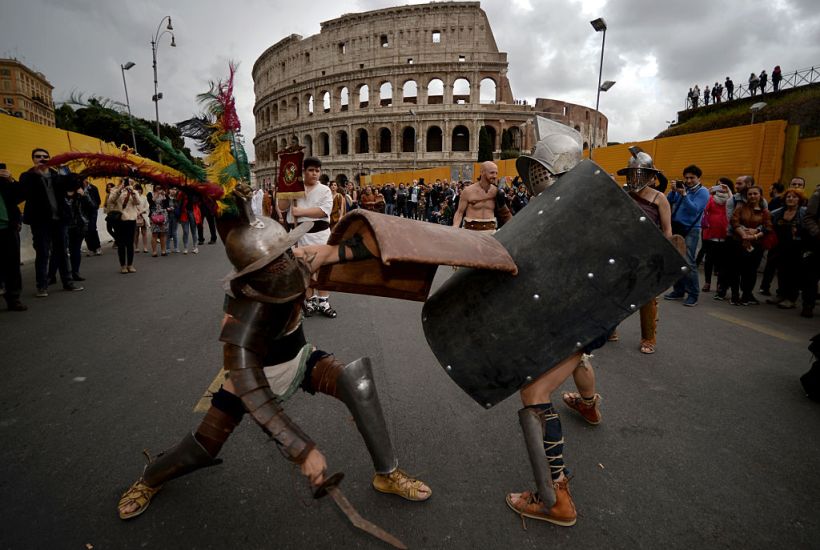Why do men think about the Roman Empire so much? That’s the subject of a new social media trend, where women ask their partners how often they think about ancient Rome.
Some men do it every day; one admitted to doing it three times a day. But why is it men who love the Empire so obsessively? ‘There’s so much to think about,’ one man said to his fiancée on TikTok. Another admitted he loved ‘their aqueducts and the fact that they had concrete that could harden’.
He’s right. The Pantheon in Rome was built out of a special Roman concrete that has held up its extremely delicate dome since 126 AD. Some academics say that the teaching of Roman history has concentrated on its masculine aspects: gladiators, legions, warfare and imperial eagles.
My early classical education certainly concentrated on that sort of thing. My first Latin text was Julius Caesar’s Commentaries on the Gallic War and my first vocab lists were crammed with spears, shields, fortresses and defensive ditches.
It’s crazy to think of the study of Rome as a male thing. Rome and the Roman Empire were far too sophisticated – and huge – to be so limited
The study of Roman wars also fitted with boys’ military hobbies in the 1970s and 1980s. I never met a single girl who played Risk, the game of global domination, or Battleships, where you sank your opponents’ ships.
What was much worse in those days was that many fewer girls actually studied full classics. At my prep school, girls weren’t even allowed to learn Greek. At their secondary schools, they weren’t as well taught as I was at Westminster School. When girls got to the school in the sixth form, they were just as clever, if not more so than us boys, but they hadn’t been taught nearly as much of the nuts and bolts of the Latin language; and even less Greek.
That segregation of the sexes, when it came to classics, had lasted for centuries. But it’s changing now. Partly because of a tragic decline across the board of rigorous teaching of Latin and Greek for both men and women.
But also because women are becoming much more prevalent in the classical teaching world, not least the reigning Queen of Classics, Professor Mary Beard, whose new book Emperor of Rome is about to be published.
Quite right, too. It’s crazy to think of the study of Rome as a male thing. Rome and the Roman Empire were far too sophisticated – and huge – to be so limited.
Yes, the majority of leading figures in the classical world were men – another reason that those men on social media identify with the Empire. There were no female emperors, senators or soldiers – although there were the Amazons, the legendary fighters who sliced off their right breasts to fire their arrows more effectively.
But mighty female characters do crop up in Roman history all the same. Queen Boadicea almost pulled off one of the great rebellions against the Empire in Britannia. Meanwhile, the imperial bloodline is rich in scheming, clever, dastardly women, chief among them the Empress Livia, who married Augustus and was the mother of the Emperor Tiberius.
In mythology, too, women play second fiddle to men, particularly in the battles between the gods. It’s no coincidence that the Odyssey and the Aeneid are named after male heroes. But, again, there are tremendous women in Greek and Roman mythology, chiefly Juno and Hera, her Greek equivalent.
Some of the finest episodes in the Odyssey and the Aeneid are sparked by women. It’s striking that, of the 10 years Odysseus spent making his way back from Troy to his dear wife, Penelope, in Ithaca, seven years were spent being waylaid by the charms and magic of figures like the witch Circe, the enchanting princess Nausicaa and bewitching Calypso.
Is there any love story more heartbreaking than Aeneas and Dido? Aeneas’s desertion of Dido is the ultimate girlfriend-dumping scene – enough to bring tears to any reader, male or female.
It’s true, too, that most of the classical poets were men – though don’t forget Sappho. But their subjects are, more often than not, women – and how well they write about them, not least Lesbia, Catullus’s cruel lover. Who better has caught the agony of love between man and woman:
‘Odi et amo. Quare id faciam, fortasse requiris. Nescio, sed fieri sentio et excrucior.’
‘I hate and I love. You might ask why I do this. I don’t know but I feel it happening to me and I’m in agony.’
Remember too that the greatest war in history was over a woman, Helen, the most beautiful woman in history, who sparked off the Trojan War, the Iliad and the Odyssey. As Virgil said of Dido, ‘Dux femina facti’ – ‘A woman was the leader of the enterprise.’
Women were much more instrumental in Roman history than some people might think. It isn’t just men who should be obsessed with the greatest civilisation of all.
Got something to add? Join the discussion and comment below.
Get 10 issues for just $10
Subscribe to The Spectator Australia today for the next 10 magazine issues, plus full online access, for just $10.



















Comments
Don't miss out
Join the conversation with other Spectator Australia readers. Subscribe to leave a comment.
SUBSCRIBEAlready a subscriber? Log in